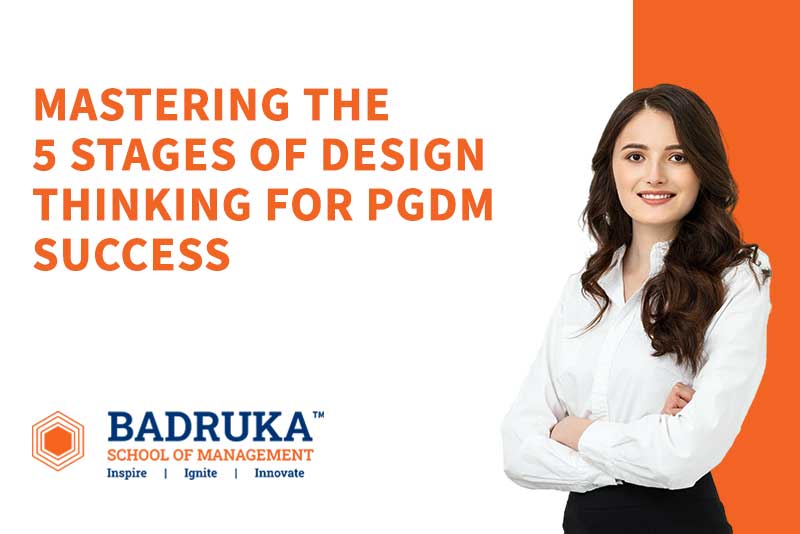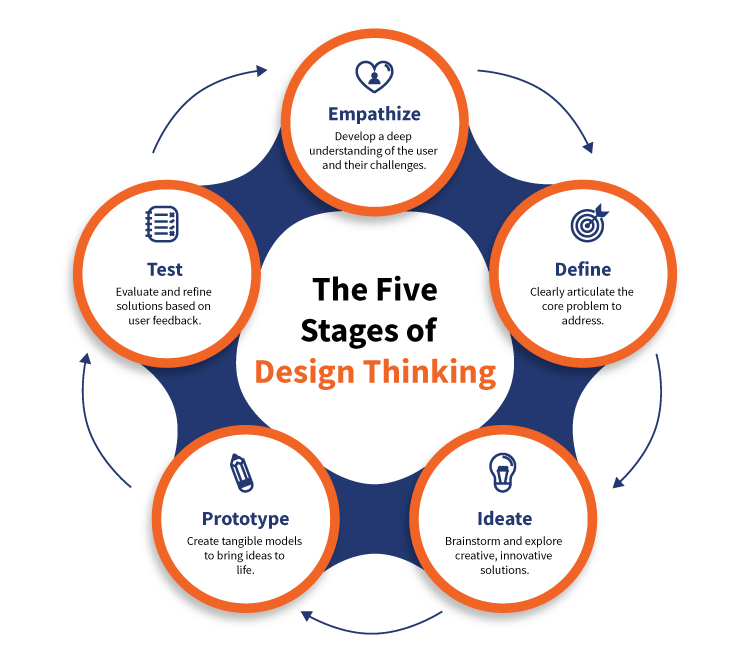Design thinking has emerged as a powerful methodology that enables individuals to approach complex problems creatively and efficiently. For PGDM (Post Graduate Diploma in Management) students, mastering the stages of Design Thinking is crucial for becoming adaptable, innovative leaders. This approach is particularly useful in management education, as it encourages out-of-the-box thinking while solving real-world challenges.
The 5 stages of Design Thinking
With an explanation of how each can contribute to PGDM’s success.
1. Empathise
The first stage of Design Thinking revolves around empathy. It requires individuals to place themselves in the shoes of the end user to truly understand their problems and needs. For PGDM students, empathy is essential as it helps in identifying consumer pain points, which is crucial for market research and customer relations. By engaging with users through interviews, observations, and surveys, students can gather deep insights that will inform the later stages of their problem-solving process. Building empathy allows future managers to develop solutions that are both innovative and user-focused, helping them excel in customer-centric industries.
2. Define
Once the empathy phase is complete, the next step is to define the problem clearly. In the context of business management, this involves synthesising the information gathered during the empathy stage and translating it into a concrete problem statement. PGDM students can greatly benefit from this stage, as it sharpens their ability to identify root causes rather than surface-level symptoms. A well-defined problem enables students to focus their efforts on developing targeted solutions, making this step crucial for effective business strategies and project management.
3. Ideate
The ideation stage is where creativity takes centre stage. After defining the problem, it’s time to brainstorm possible solutions. Design thinking encourages the generation of as many ideas as possible without judgment. This approach fosters innovation by allowing students to explore unconventional solutions that they might otherwise overlook. For PGDM students, ideation develops their critical and creative thinking skills, which are highly valuable in a management role. The ability to generate diverse solutions not only drives innovation but also equips students to handle complex business challenges with agility and confidence.
4. Prototype
Prototyping involves creating scaled-down versions of potential solutions. This stage allows PGDM students to experiment with different approaches and test their feasibility before implementing them on a larger scale. In a business context, prototypes can take many forms, such as models, simulations, or even marketing strategies. Prototyping helps students identify the strengths and weaknesses of their ideas, enabling them to make necessary improvements. The hands-on aspect of this stage also helps develop practical problem-solving skills, essential for business leadership.
5. Test
The final stage of Design Thinking is testing the prototypes with real users. This stage provides valuable feedback that can further refine the solution. For PGDM students, testing is crucial as it teaches them to adapt to changing circumstances and refine their strategies based on real-world outcomes. In the dynamic business environment, this iterative process helps students become more resilient and agile, as they learn to adjust their approach based on feedback and new information. Testing ensures that the solutions they develop are both effective and aligned with customer needs, which is vital for long-term business success.
Leveraging Design Thinking for PGDM success
By mastering the five stages of Design Thinking, PGDM students can unlock a wealth of benefits that extend beyond the classroom. Leveraging Design Thinking methodologies enables them to develop creative solutions, enhance their problem-solving skills, and foster a mindset of continuous improvement. These skills are critical in today’s dynamic and complex management landscape, where adaptability and innovation are key drivers of success.
A Post Graduate Diploma in Management programme from a leading business school like Badruka School of Management provides a conducive environment for applying Design Thinking principles.
The pillars of Badruka’s PGDM programme

Core Management Courses
Core courses cover Strategy, Finance, Marketing, HR, Operations, and Economics, providing a solid foundation in management.

Focus on Data, Technology, and Entrepreneurship
The second-year curriculum offers specialisations in Finance, Marketing, Strategy, Entrepreneurship, and Data Analytics & Digital Technologies.

Essential Skills and Perspectives
Short modules include leadership, AI, communication, and critical thinking, preparing students for the modern workplace.

Experiential Learning
Live projects, flipped classrooms, and case studies build problem-solving and strategic-thinking skills through real-world applications.

Internship and International Immersion
Students can pursue international immersion and internships, earning credits toward PGDM completion before year two.
Check out the PGDM curriculum!
This programme stands out due to its multidisciplinary approach, incorporating relevant allied fields such as technology, finance, and marketing. With internationally accredited faculty and practical projects designed for hands-on learning, students get the opportunity to apply Design Thinking in real-world settings.
Take a look at BSM’s world-class faculty shaping it’s educational excellence
The school’s extensive corporate network offers valuable industry connections, making this PGDM programme a reliable stepping stone to a successful career in business management.
Check out Badruka’s PGDM admission process, and requirements!








